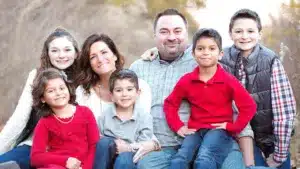
Fetal Alcohol Spectrum Disorders (FASD) is an umbrella term for a broad range of conditions caused by prenatal alcohol exposure. It’s incredibly common—it’s estimated that 1 in 20 people fall on the FASD spectrum. This number is likely even higher for adopted children. While FASD can at times be a puzzling condition that is difficult to be diagnosed, there is so much hope for children and families living with FASD! The most important thing to remember? A lot of the “treatment” for FASD involves adjusting your mindset!
What is FASD?
Fetal Alcohol Spectrum Disorders is exactly that, a spectrum. For individuals who are on the mild side of the spectrum, they might go their entire lives without a diagnosis or needing much additional support. This can sometimes manifest as “ADHD-like” symptoms. For children who are more severely impacted, FASD can show up in a variety of ways. Common symptoms include physical problems and/or problems with behavior and learning. Individuals with FASD may experience some degree of challenges in their daily living, and need support with motor skills, physical health, learning, memory, attention, communication, emotional regulation, and social skills in order to reach their full potential. It’s important to remember that every child is different! FASD can impact children in different ways and can range from mild to severe.
FASD can be difficult to diagnose. If you suspect that your child was prenatally exposed to alcohol, it’s important to discuss this with your pediatrician.
Treatment Options for FASD
Much of the “treatment” for children living with FASD involves a shift in the mindset and expectations of their parents. While every child is different and it’s important to first consult your medical provider, the below tips are a helpful jumping off point.
Keep it simple
Breaking tasks into manageable chunks, using checklists, and simplifying instructions whenever possible will go a long way.
Reframe your child’s behavior
It’s important to remember that for children living with FASD, puzzling behavior often falls into the “can’t” instead of the “won’t” category. FASD is an invisible disability. Thinking about it in this way can help parents find patience and grace during bouts of difficult behavior.
Stick to a Schedule
Routines are important for all children, but particularly for kids living with FASD. Creating a schedule and structure will allow your child to feel more in control and know what to expect.
There is so much hope for children with FASD—and it starts with prepared, loving parents!
Learn more about parenting a child with FASD by taking a Families Are Forever class.
Ready to learn more? Reach out to us at inquiry@allgodschildren.org.
*Please consult your medical provider for more information and specific local resources in your area.












